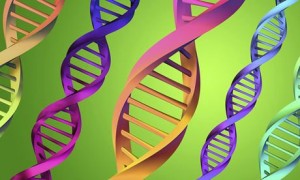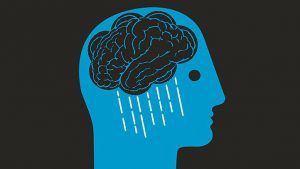Depression is a leading cause of disability worldwide, contributing considerably to early mortality. Despite significant efforts, the genetics underlying depression has been difficult to identify and there has been limited progress in developing new treatments. Last month the largest genome-wide association study of depression was published in Nature Genetics (1). This study represents remarkable progress with numerous novel and motivating findings, summarised here by EDIT Lab PhD student, Chris Rayner.
First it is important to think about why it has taken so long to detect genes associated with depression…
Evidence from decades of twin studies shows that depression is a moderately heritable (~40%), complex disorder (see our previous post on D for Depression). We have also learned from molecular genetic studies that the genetic risk underlying depression can be attributed to many genetic variants, each with very small effects (2). This is part of the reason why it has been so difficult to find specific genes. Furthermore, depression is particularly heterogeneous (that is to say, it presents in many different ways across the population). For example, there are ten core depressive symptoms – six of which are required for a diagnosis. The most recent diagnostic algorithm assigns a diagnosis of major depressive disorder to any of 227 combinations of symptoms. This level of heterogeneity means that extremely large samples are required to detect significant genetic effects (3).
The study conducted by the Psychiatric Genetics Consortium used data from 135,000 affected individuals and 345,000 healthy control subjects, to determine which genetic variants are more common among cases than controls.
The headline finding was the discovery of 44 independent genetic variants associated with depression, 14 of which had been previously detected and replicated, and 30 of which are novel. This study represents remarkable progress and a significant milestone in depression research.
In this paper, researchers also performed gene-wise and gene-set analyses. This involved combining the individual genetic effects at the level of the gene, and then also grouping genes into functional pathways. This can be done to improve statistical power to detect associations and to infer underlying biological mechanisms. By doing so, they were able to implicate a role for over 150 genes and 19 significant pathways. Furthermore, using functional data (genotype-tissue expression data) they demonstrate an enrichment of genetic association signals expressed specifically in neurons and in cortical regions, which we know are important for executive function and emotional regulation. This is extremely encouraging, demonstrating that the association signals are representative of the phenotype and that depression is largely a disorder of the brain.
Large samples are required to detect significant genetic effects among people experiencing depression.
“This holds promise for the many individuals who do not respond well to current medications”
Next, the researchers found that many of the genes associated in the gene-wise test were linked to targets of current antidepressant medications. Most importantly, the novel genetic findings reported in this paper provide new candidates for research into the biological mechanisms underlying depression and targets for the development of new medications. This holds promise for the many individuals who do not respond well to current medications.
By combining the genetic effects at the level of the genome (genetic risk scores), the researchers were also able to demonstrate that individuals with more severe diagnoses (i.e. early onset of symptoms, high severity of symptoms, and recurrent symptoms) carry higher genetic risk burden than individuals with less severe diagnoses (i.e. later onset of symptoms, moderate severity of symptoms, and single episode of symptoms). Overall, individuals in the top 10% for genetic risk have a 2.5-fold increased risk of developing depression when compared to individuals in the bottom 10%.
“This is extremely encouraging, demonstrating that the association signals are representative of the phenotype and that depression is largely a disorder of the brain.”
In line with previous findings, high genetic correlations were also found between depression diagnosis and depressive symptoms (measured quantitatively – supporting the idea that the disorder lies further to the extreme end of the genetic distribution). Furthermore, there were high genetic correlations between depression diagnosis and a range of other phenotypes, including anxiety disorders and neuroticism; as well as moderate genetic correlations with depression diagnosis and schizophrenia, autism, ADHD and bipolar. Mild positive genetic correlations were observed between depression and measures of weight / obesity, and mild negative correlations were observed with measures of educational attainment.
A novel method called Mendelian randomisation was then used to infer a causal link between body mass index (BMI) and depression (1.2 fold increase in risk for major depressive disorder (MDD) per standard deviation in BMI); a protective role for educational attainment (0.84 fold decrease in MDD risk per standard deviation of educational attainment); and potentially shared causal pathways between depression and schizophrenia.
“Overall, individuals in the top 10% for genetic risk have a 2.5-fold increased risk of developing depression when compared to individuals in the bottom 10%”
After many years of smaller studies and limited findings, this study exemplifies the successes of global, collaborative efforts and larger sample sizes. As seen previously in schizophrenia research, we can confidently predict that with increased samples that many more genetic variants associated with depression will be discovered and it is now the second most successful psychiatric disorder in terms of GWAS discovery.
References:
- Wray, N. R. et al. Genome-wide association analyses identify 44 risk variants and refine the genetic architecture of major depression. Nat. Genet. 50, 668–681 (2018).
- Visscher, P. M., Brown, M. A., McCarthy, M. I. & Yang, J. Five Years of GWAS Discovery. Am. J. Hum. Genet. 90, 7–24 (2012).
- Wray, N. R. & Maier, R. Genetic Basis of Complex Genetic Disease: The Contribution of Disease Heterogeneity to Missing Heritability. Current Epidemiology Reports 1, 220–227 (2014).




